 Petzlover
Petzlover American Shorthair is originated from United States but Siamese/Tabby is originated from United Kingdom. Both American Shorthair and Siamese/Tabby are having almost same weight. Both American Shorthair and Siamese/Tabby has same life span. Both American Shorthair and Siamese/Tabby has same litter size. Both American Shorthair and Siamese/Tabby requires Low Maintenance.
American Shorthair is originated from United States but Siamese/Tabby is originated from United Kingdom. Both American Shorthair and Siamese/Tabby are having almost same weight. Both American Shorthair and Siamese/Tabby has same life span. Both American Shorthair and Siamese/Tabby has same litter size. Both American Shorthair and Siamese/Tabby requires Low Maintenance.
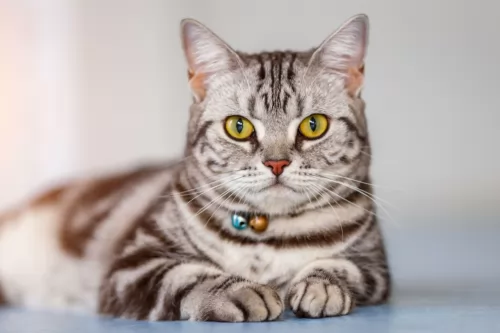 Often sailors of old would keep cats onboard to protect their stores from mice and rats, and so it was when settlers sailed from Europe to North America.
Often sailors of old would keep cats onboard to protect their stores from mice and rats, and so it was when settlers sailed from Europe to North America.
They had cats onboard and once onshore they interbred. But in the 20th century, a selective breeding program began to bring out the best qualities of these cats.
The American Shorthair is one of these cats – a pedigreed cat that is accepted by all North American cat registries. At first, the cat was known as the Domestic Shorthair but it was renamed in 1966.
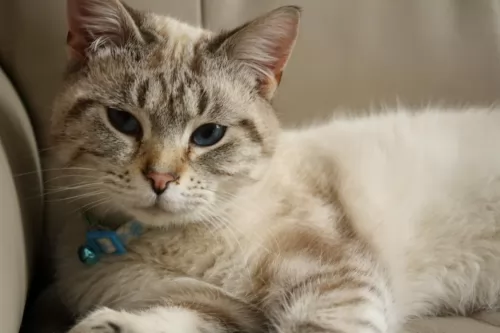 Lynx point Siamese cats are believed to also be known as Tabby point Siamese in the UK. Breeding of these cats began in about the 1940s and the first kitten born was crossed with a purebred Seal Point cat. That was the start of the seal tabby point Siamese cat.
Lynx point Siamese cats are believed to also be known as Tabby point Siamese in the UK. Breeding of these cats began in about the 1940s and the first kitten born was crossed with a purebred Seal Point cat. That was the start of the seal tabby point Siamese cat.
After the first kitten was born, many people were intrigued with it and it got plenty of attention, and breeders knew that to please cat lovers everywhere they would have to start producing these wonderful tabby Siamese points.
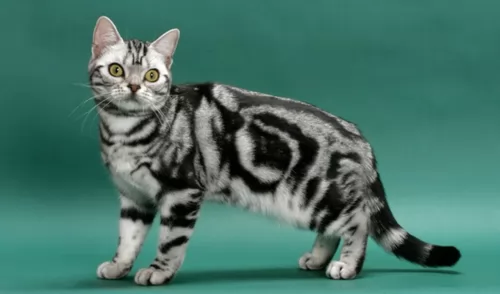 The American Shorthair is a large, sturdy cat with a round face and short ears. Their coats can come in many different patterns and colors. They shed so the fur will need to be brushed from time to time.
The American Shorthair is a large, sturdy cat with a round face and short ears. Their coats can come in many different patterns and colors. They shed so the fur will need to be brushed from time to time.
They stand at about 20 – 25cm in height and they weigh between 5 and 7kg.
The American Shorthairs are easy, no-fuss cats. They’re also low maintenance, healthy, amicable cats, ready to even be friends with strangers and your dogs.
He is an intelligent cat too so it will be important to provide him with toys that challenge him to think. These good-natured cats make perfect famiy companions.
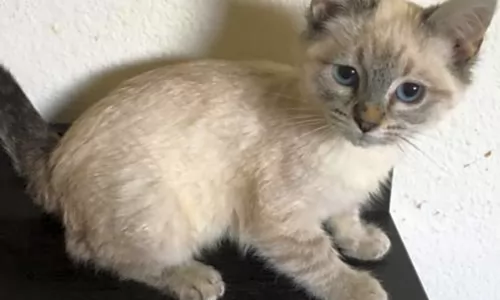 The Tabby pointed Siamese cat is medium-sized and can weigh between 3 and 5kg. He has some stripes, mostly around the legs, and the tail is also striped. These cats are available in many different colors – blue, lilac, apricot, seal, and chocolate. The ears are triangular-shaped and there is an ‘M’ shaped mark on the forehead of the cat. All these markings make the cat most distinctive.
The Tabby pointed Siamese cat is medium-sized and can weigh between 3 and 5kg. He has some stripes, mostly around the legs, and the tail is also striped. These cats are available in many different colors – blue, lilac, apricot, seal, and chocolate. The ears are triangular-shaped and there is an ‘M’ shaped mark on the forehead of the cat. All these markings make the cat most distinctive.
The Siamese and Siamese Tabby cats share many similarities in character. They are social cats, loving the interaction with their human families. They’re loyal, intelligent cats and they love to play.
They can live to be about 15 to 20 years of age and throughout this time they will provide you with love, companionship, entertainment, and joy.
In fact, they thrive so much on your company, that they can easily become lonely and run-down when left alone for too long.
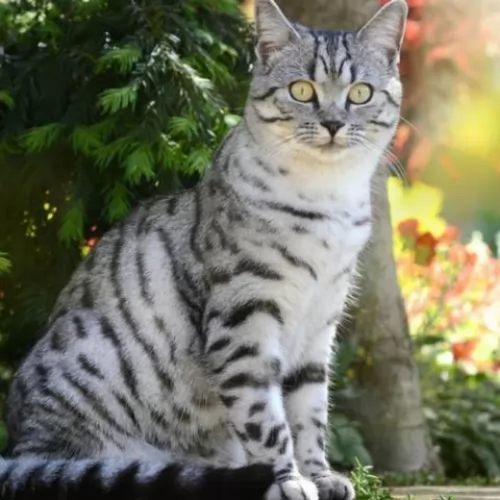 The American Shorthair is a playful cat and is quite capable of amusing himself, but will welcome your games too. He’s a big cat so make sure he gets enough exercise to avoid him becoming obese.
The American Shorthair is a playful cat and is quite capable of amusing himself, but will welcome your games too. He’s a big cat so make sure he gets enough exercise to avoid him becoming obese.
He is a low maintenance cat and you don't have to be worrying about him too much as he just likes to get on with life. He loves being well-fed, getting your attention and lying in the sun.
This is one cat that doesn’t need a lot of attention so being easy to care for, independent, playful, and affectionate, you’re going to have one of a kind companion and friend.
 These cats are people-loving cats – they just crave the companionship of their human family although they’re not particularly fond of strangers.
These cats are people-loving cats – they just crave the companionship of their human family although they’re not particularly fond of strangers.
They make wonderful pets as they actually want to be involved in everything that theur human owners are busy with. They truly are companionable.
They’re intelligent and playful and he will even love to go on a walk with you but then it is best to have him on a leash. Bring one of these awesome cats into your home and you’re guaranteed to have a friend for life.
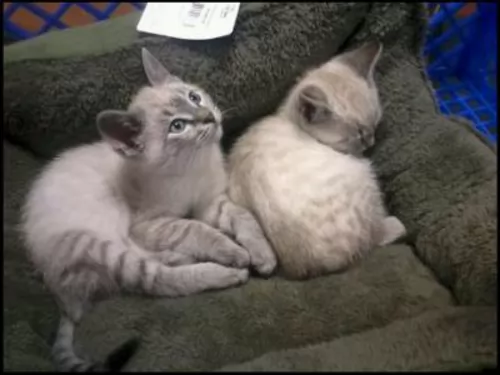 When you look at your cat, you want to see that his eyes are bright and clear, his fur is shiny, he is of a good weight and that he is energetic and content. Not looking like this could indicate health problems for your feline friend. He will need to get to the vet for his vaccines and the vet will check him over to so as to make sure he is in tip-top health.
When you look at your cat, you want to see that his eyes are bright and clear, his fur is shiny, he is of a good weight and that he is energetic and content. Not looking like this could indicate health problems for your feline friend. He will need to get to the vet for his vaccines and the vet will check him over to so as to make sure he is in tip-top health.
Make sure to check him over for parasites and these can cause diarrhea as can other issues such as bacteria, viruses, and the wrong food.
Frequent vomiting is also not normal as well as straining to urinate. These are all instances when you want to get your pet to the vet as soon as possible.
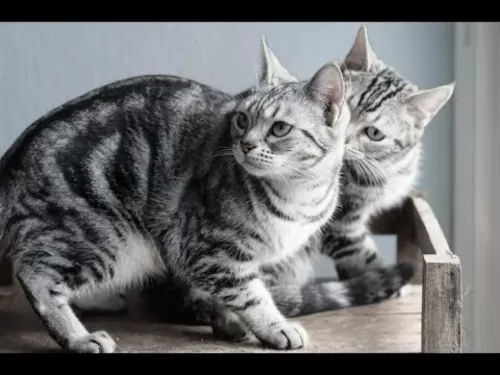 Your American Shorthair will benefit greatly from regular brushing and he looks forward to this grooming period and being pampered by you for a few minutes.
Your American Shorthair will benefit greatly from regular brushing and he looks forward to this grooming period and being pampered by you for a few minutes.
It helps to remove the dead hair from his coat and this is important so that he doesn’t ingest the loose hair. While you’re brushing him, you can also run your fingers over him to make sure there are no unusual lumps. Anything odd or any sign of illness you should take your cat to see the vet immediately.
Make sure your American Shorthair has access to the best quality food there is. There are many commercially manufactured cat foods available and your vet can advise you on the best one to choose.
Cats are carnivores so aways choose food that is high in proten. Food must be provided in accordance with the cat’s age and energy levels. Certainly a generic cat or one with a medical condition will need a certain type of food than a young, frisky kitten. Make sure your cat always has access to fresh, cool water.
Make sure your furry feline friend has everything he needs to ensure he is comfortable. This includes feeding bowls, toys, a litter box, soft bedding, nutritious food as well as scratching post and climbing equipment.
Have your pet neutered or spayed if you don’t want kittens from your cat. These procedures have enormous health benefits for your pet and it prevents even more kittens coming into a world that already has far too many unwanted pets.
Make sure your cat is up to date with all his vaccines because without being vaccinated your cat can succumb to any one of the life-threatening cat illnesses there are. Kittens need to have their first vaccines at 8 weeks of age.
If you have to take your cat to the vet you need a carrier basket so that your cat feels comfortable and safe inside it.
You can’t just put your cat on a leash and take him to the vet as inside the car he will lurch around and cause you to lose attention. A transport box that is familiar to your cat will be the best way for you and your cat to travel.
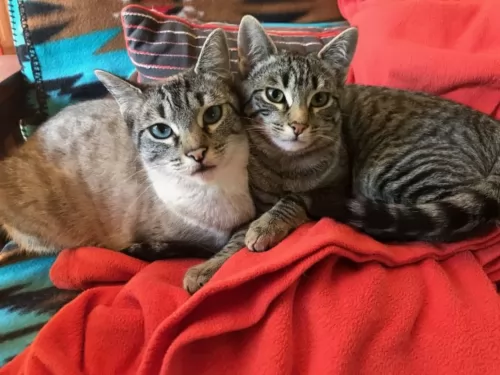 Before you commit to bringing a Siamese/Tabby into your home you must have everything ready for him.
Before you commit to bringing a Siamese/Tabby into your home you must have everything ready for him.
He will need food and water bowls, commercial cat food, grooming brush, a soft warm bed, collar and tag, litter box, a carrying container to get him to the vet safely, climbing tree, and scratching post.
The fine, silky coat doesn’t shed much and can easily be maintained with a weekly brush.
You will need to trim your cat’s paws. Trimming the claws can be difficult with a squirming cat and you can easily hurt him because of that. Rather get him to the vet who will do it for you.
Make sure to feed your Siamese/Tabby the very best cat food there is as poor quality food can contribute to poor health.
A cat is a carnivore and you therefore have to ensure that his food is made up essentially of meat. The commercial cat foods of today are formulated as dry, semi-moist, and canned and they offer a wonderfully convenient way for you to feed your cat. When you choose the best ones, they are palatable and digestible for your cat.
You just have to remember that your cat’s nutritional requirements change with his different stages of life. A kitten can’t possibly eat the same food as an adult cat. The nutritional claim on the cat food label will be a guide for you as to what your cat should be eating. Always ensure a constant supply of fresh, cool water.